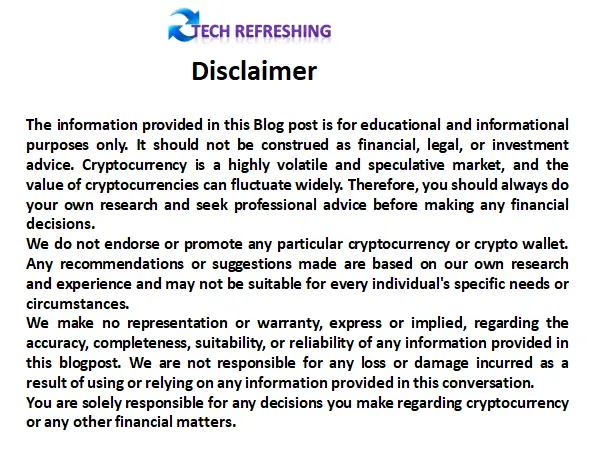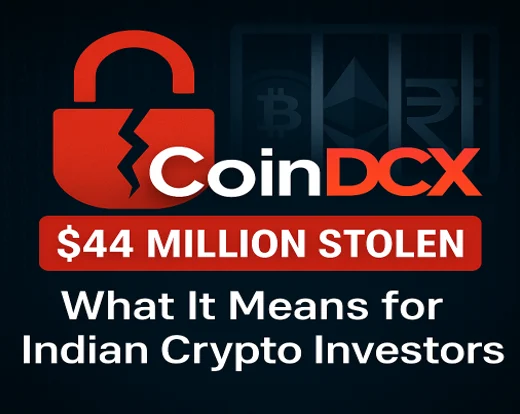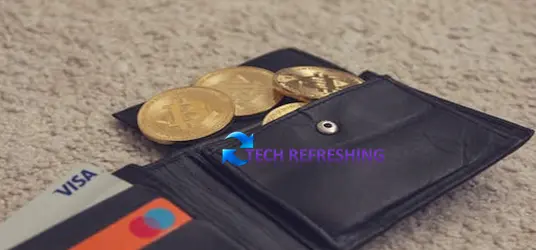
Cryptocurrencies have gained immense popularity in recent years, with more and more people investing in Bitcoin, Ethereum and other altcoins. As the value of these digital assets continues to increase, it becomes increasingly important to ensure that they are stored securely. Crypto wallets play a crucial role in keeping your cryptocurrencies safe from theft and fraud.
A crypto wallet refers to either a software or hardware tool that permits users to store, send, and receive cryptocurrencies. To gain access to your digital assets, the wallet generates public and private keys. The private key serves as a password that unlocks your wallet and enables you to control your funds. Should someone else obtain your private key, they can steal your cryptocurrencies, which underscores the importance of utilizing a secure crypto wallet.
For the purpose of protecting your cryptocurrency, this post will provide a succinct description of why a secure crypto wallet is necessary. The different kinds of crypto wallets will be covered, along with the security aspects that go along with them. Also, we will review some of the top cryptocurrency wallets currently on the market, contrasting their features, and provide advice on how to choose the wallet that best suits your needs. You ought to have a thorough grasp of the significance of having a safe cryptocurrency wallet by the end of this article, as well as the procedures involved in choosing the best one for your digital assets.
What are Crypto Wallets?
Digital storage spaces known as crypto wallets are utilized to store, send and receive cryptocurrencies while also tracking transaction history. For anyone investing in cryptocurrencies and seeking to safeguard their digital assets, utilizing these wallets is crucial.
There are different types of crypto wallets, including hot wallets, cold wallets, software wallets and hardware wallets.
Hot Wallets
Hot wallets are software wallets that are internet-connected, enabling users to access them through a web browser or mobile app and are typically utilized by frequent cryptocurrency traders. Due to their ease of use and simplicity, they are a popular option for beginners. Nevertheless, hot wallets are more vulnerable to security breaches and hacking as they remain constantly connected to the internet, which can compromise the safety of your digital assets.
Cold Wallets
Cold wallets, also known as offline wallets, are hardware wallets that function without an internet connection. Typically in the form of USB devices, they are deemed the most secure way to store cryptocurrencies. Cold wallets are perfect for long-term storage of substantial amounts of digital assets. Nonetheless, they can be inconvenient to use as they require a physical connection to a computer or mobile device to access the stored cryptocurrencies.
Software Wallets
Software wallets refer to digital wallets that can be installed and downloaded on a computer or mobile device and they can be either hot or cold. They can be customized according to the user’s preferences, making them a preferred choice for most people. Nevertheless, software wallets are more vulnerable to hacking and other security breaches, requiring users to take extra precautions to safeguard their digital assets. Though convenient to use, their susceptibility to cyber threats demands that users prioritize their wallet’s security.
Hardware Wallets
Hardware wallets are small physical devices that store the user’s private keys offline. They are regarded as the most secure kind of cryptocurrency wallet as they are not online. Because they are simple to use, hardware wallets are a preferred option for those who are serious about safeguarding their digital assets. But because they might be pricey to buy and vulnerable to damage or loss, it’s critical to store them safely.
There are benefits and drawbacks to each kind of cryptocurrency wallet. Hot wallets are convenient to use but are less secure, while cold wallets are the most secure but can be inconvenient to use. Software wallets offer a balance between security and convenience, while hardware wallets are the most secure but can be expensive. It’s important to consider your needs and priorities when choosing a crypto wallet to ensure that your digital assets are kept safe.
Features of Secure Crypto Wallets
Selecting a crypto wallet mandates prioritizing security above all other factors. A secure crypto wallet should possess various features that guarantee the protection of your digital assets against fraud and theft. Here are several features that characterize a secure crypto wallet:
Private Key Ownership
Private key ownership is among the most vital security attributes of a crypto wallet. Akin to a password, the private key enables you to access your wallet and digital assets. It is essential to ascertain that you possess full control over your private key, and it is not held by the wallet provider. This attribute is known as non-custodial ownership, ensuring that you are the sole person capable of accessing your funds.
User Control Over Funds
The user should have total control over their money in a safe cryptocurrency wallet. The wallet provider shouldn’t be able to freeze or seize your funds as a result. There should be no constraints or limitations placed on the user’s ability to send and receive money.
Two-Factor Authentication
Two-factor authentication is a security measure that incorporates an extra layer of protection to your wallet. It necessitates the user to input a code or employ a biometric feature (e.g., fingerprint or facial recognition) alongside their password to access their wallet. This guarantees that in case an unauthorized person gains access to your password, they cannot access your wallet without the additional factor.
Backup and Recovery Options
A secure crypto wallet should provide backup and recovery options in case of lost or damaged devices. This can include recovery seed phrases, which are a series of words that can be used to recover your private keys if your device is lost or damaged. It is important to keep these seed phrases in a safe place and not share them with anyone.
Open Source Code
A crypto wallet featuring open-source code implies that the code is publicly accessible for anyone to scrutinize and inspect. This guarantees transparency and verifies that the wallet is secure and devoid of any security loopholes.
A secure crypto wallet should prioritize private key ownership, user control over funds, two-factor authentication, backup and recovery options and open-source code. By ensuring that your wallet has these features, you can have peace of mind that your digital assets are stored safely and securely.
Top Crypto Wallets for Secure Storage of Bitcoin and Altcoins
There are several crypto wallets available in the market, each with their own set of features and security protocols. Here are some of the top crypto wallets for secure storage of Bitcoin and altcoins:
Ledger Nano X
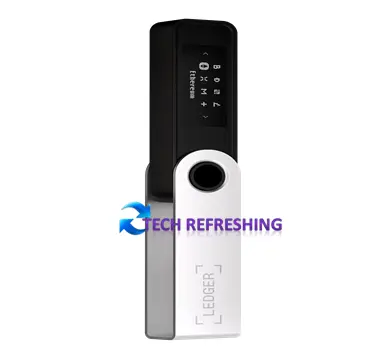
The Ledger Nano X is a hardware wallet that boasts outstanding security features, making it a top choice for safeguarding your digital assets. With support for over 1,800 cryptocurrencies, it enables you to store and manage a vast array of crypto holdings. This wallet features Bluetooth connectivity, allowing for convenient use with mobile devices. It comes with a built-in rechargeable battery and a user-friendly large display screen for seamless operation. Private keys are securely stored on the device, and the wallet is fortified with a PIN and a recovery seed phrase, adding an extra layer of protection. However, it’s important to note that the Ledger Nano X is more expensive compared to other wallet options.
Trezor Model T
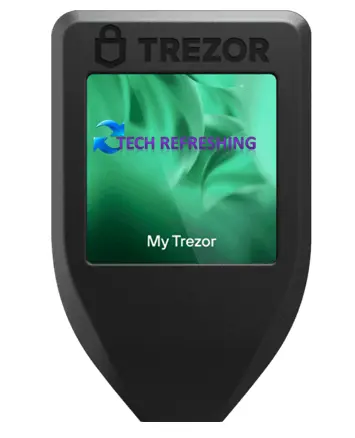
The Trezor Model T is a hardware wallet that has gained popularity due to its top-notch security features, which keep digital assets secure. A wide variety of cryptocurrencies, including well-known ones like Bitcoin, Ethereum and Litecoin, are supported by it. Even beginners may use the smartphone easily thanks to its user-friendly UI and high-quality touch screen.
The device securely holds the private keys and access to it is restricted by a PIN code that must be input. The wallet also employs a recovery seed phrase that, in the event that your device is lost or damaged, can be utilised to retrieve your funds.
Due to its cutting-edge security features, like password manager integration and two-factor authentication, the Trezor Model T promises outstanding security. These functions are intended to provide additional security layers to ensure the protection of your cash.
In addition to its top-notch security features, the Trezor Model T enables multi-signature transactions, which necessitate the approval of numerous users before a transaction can go through. This additional security layer makes it harder for unauthorized parties to gain access to your funds.
The Trezor Model T’s restricted Bluetooth connectivity, which might be a bother, is its primary flaw. It can be less easy to use the device when on the go because you can only connect it to your computer or mobile device using a USB cable.
Exodus Wallet
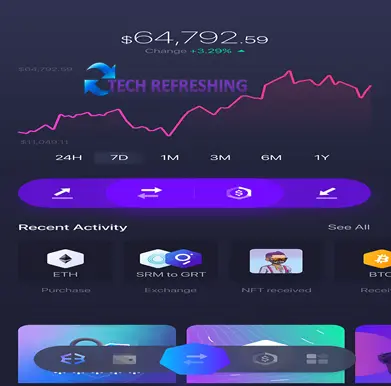
Exodus Wallet is a software wallet that provides a simple and secure way to store, manage, and exchange cryptocurrencies. It was founded in 2015 by JP Richardson and Daniel Castagnoli and is based in Nebraska, United States.
Exodus supports over 100 cryptocurrencies, including popular ones like Bitcoin, Ethereum, Litecoin, and Ripple, as well as lesser-known ones like Chainlink, OmiseGO and Golem. Users can exchange one cryptocurrency for another directly within the wallet using the built-in exchange feature, which is powered by the popular exchange platform, ShapeShift.
The user interface of Exodus is one of the game’s most notable aspects because it is both attractive and simple. Beginners can easily start using cryptocurrencies because to the wallet’s user-friendly design. The dashboard gives a summary of the user’s portfolio, along with its current value and includes graphs and charts to show performance over time.
Exodus is renowned for having strong security measures. Only the user has access to their money because the wallet encrypts all private keys and transaction data on the user’s device. Also, it provides two-factor authentication, which heightens security during the login procedure.
Exodus also has the benefit of not requiring users to give out any private information, such their name or address, in order to use the wallet. Those who cherish their privacy would greatly benefit from this.
Exodus can be accessed through its desktop application compatible with Windows, macOS and Linux, and also through its mobile app for iOS and Android. The wallet allows users to synchronize their accounts across various devices, providing them with easy access to their funds from anywhere.
Exodus levies a nominal cost for each transaction, which goes towards compensating the blockchain network for handling the transaction. The charge is variable and dependent on the level of network congestion at any given time.
Exodus Wallet is a popular and user-friendly software wallet that provides a secure and easy way to store, manage and exchange cryptocurrencies. Its beautiful interface, security features and broad cryptocurrency support make it a great choice for both beginners and experienced cryptocurrency users.
MyEtherWallet

A free, open-source, web-based wallet called MyEtherWallet (MEW) enables users to store, control and send Ethereum and other ERC-20 tokens. Taylor Monahan and Kosala Hemachandra founded it in 2015 with the intention of offering a simple user experience for engaging with the Ethereum network.
The user-friendly, straightforward layout of MyEtherWallet is one of its best qualities. In only a few clicks, users can view their transaction history, import existing wallets and create new ones. The dashboard shows a summary of the user’s portfolio, together with its current value, as well as time-series performance graphs and charts.
MyEtherWallet also offers support for hardware wallets such as Ledger and Trezor, which allows users to store their private keys offline and add an additional layer of security to their accounts.
MyEtherWallet’s compatibility with many Ethereum-based dApps is another benefit (decentralized applications). Users don’t need to manually enter their private keys or mnemonic phrases in order to connect to different dApps because they may do so immediately through the wallet.
MyEtherWallet provides robust security features by enabling users to create wallets and manage their private keys on their personal devices, giving them full autonomy over their funds. Additionally, the wallet offers two-factor authentication and the choice to generate encrypted paper wallets.
One potential downside of MyEtherWallet is that, being a web-based wallet, it is vulnerable to phishing attacks. Users should take care to verify that they are on the legitimate MEW website and not a fake phishing site before entering any sensitive information.
MyEtherWallet is a popular and user-friendly web-based wallet that provides a simple and secure way to store, manage, and transfer Ethereum and other ERC-20 tokens. Its compatibility with various dApps and support for hardware wallets make it a versatile choice for Ethereum users. However, users should be cautious of potential phishing attacks when using the web-based platform.
Coinbase Wallet
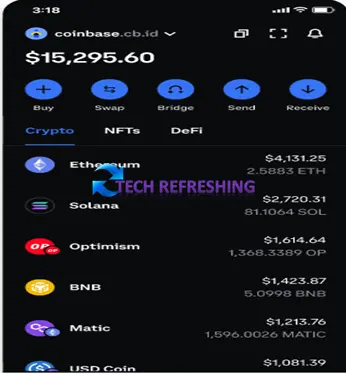
Developed by Coinbase, a renowned cryptocurrency exchange established in 2012 and headquartered in San Francisco, California, Coinbase Wallet is a mobile wallet that facilitates the storage, management and exchange of cryptocurrencies.
A diverse range of cryptocurrencies, such as Bitcoin, Ethereum, Litecoin and others, are supported by Coinbase Wallet. Furthermore, users have the ability to store and manage their private keys, providing them complete authority over their funds. You can link the Coinbase Wallet with a Coinbase account, facilitating easy transfer of funds between them.
One of the unique features of Coinbase Wallet is its integration with decentralized applications (dApps). The wallet offers a straightforward and intuitive user interface for dealing with different dApps right from the app. Users can use a variety of dApps for gaming, banking and other activities while maintaining the security of their private keys.
Coinbase Wallet also offers biometric authentication (such as fingerprint and Face ID) and two-factor authentication for added security. Additionally, the wallet allows users to create a 12-word recovery phrase that can be used to restore their wallet in case it is lost or stolen.
In terms of fees, Coinbase Wallet levies a tiny fee for each transaction that fluctuates based on the particular cryptocurrency and the level of network congestion at the time. Users can, however, change the cost to ensure that their transactions are handled fast or to reduce fees.
The seamless experience users with existing Coinbase accounts receive through Coinbase Wallet is another benefit. Users’ access to and management of their monies are made simple by the ability to move money between their Coinbase account and Coinbase Wallet.
Coinbase Wallet is a user-friendly and secure mobile wallet that provides a simple way to store, manage and exchange cryptocurrencies. Its integration with various dApps, support for biometric authentication and two-factor authentication, and ability to connect with Coinbase accounts make it a popular choice for cryptocurrency users. However, users should be mindful of transaction fees, which vary depending on the cryptocurrency and current network congestion.
The Ledger Nano X and the Trezor Model T are excellent choices for those looking for top-notch security in a hardware wallet. The Exodus Wallet and the Coinbase Wallet are good options for those looking for a user-friendly software wallet that supports a wide range of cryptocurrencies. MyEtherWallet is a great choice for those looking to store Ethereum and ERC-20 tokens securely. Ultimately, the choice of wallet will depend on the user’s specific needs and preferences.
How to Choose the Right Crypto Wallet for You
When it comes to choosing a crypto wallet, there are several factors to consider. Here are some things to keep in mind:
Security
Security is the most crucial consideration when selecting a cryptocurrency wallet. Make sure the wallet you select has strong security components like two-factor authentication, a recovery seed phrase and private key ownership. Although software wallets can be secure provided they have robust security procedures, hardware wallets are typically thought to be the most secure.
User Needs
You should choose a cryptocurrency wallet that satisfies your particular demands because different wallets have different characteristics. A hardware wallet may be a preferable option, for instance, if you intend to keep a significant number of cryptocurrencies for an extended period of time. A software wallet that works on mobile devices may be a better option if you need to access your money on the go.
Technical knowledge
Certain cryptocurrency wallets demand more technical expertise than others. For instance, hardware wallets necessitate more preparation and upkeep than software wallets. For beginners in the cryptocurrency domain, selecting a wallet with a simple and easy setup process, along with a user-friendly interface, might be more appropriate.
Budget
The pricing of a crypto wallet can vary considerably, with certain hardware wallets costing several hundred dollars. While it is crucial to keep your budget in mind when selecting a wallet, it is essential to remember that a higher price does not necessarily guarantee superior security. Numerous economical alternatives are available that offer exceptional security features.
Here are some tips for making an informed decision:
Do your Research
Take the time to research different crypto wallets and read reviews from other users. This will give you an idea of the features and security protocols of different wallets and help you make an informed decision.
Consider your specific needs
Think about what you need in a crypto wallet and choose one that meets those needs. Consider factors such as the cryptocurrencies you want to store, how often you need to access your funds, and your technical knowledge.
Start small
If you are new to cryptocurrency, it’s a good idea to start with a small amount of funds and test out different wallets to see which one works best for you.
Don’t store all your funds in one wallet
To minimize your risk, it’s a good idea to store your funds in multiple wallets. This way, if one wallet is compromised, you won’t lose all your funds.
Choosing the right crypto wallet is an important decision that should not be taken lightly. Consider your specific needs, technical knowledge and budget when making a decision and always prioritize security above all else. By doing your research and taking the time to make an informed decision, you can ensure that your cryptocurrencies are stored securely and with peace of mind.
Conclusion
Everyone who wishes to keep bitcoins safely and without worry must use a secure crypto wallet. With so many options on the market, it’s crucial to pick a wallet that suits your unique requirements and comes with strong security measures.
The present article has addressed various aspects related to crypto wallets, such as their definition, the range of wallet types available, the traits of a secure wallet and some of the leading crypto wallets on the market. Additionally, factors that must be taken into account while selecting a wallet have been discussed, along with tips to assist in making an informed decision.
We encourage everyone who owns cryptocurrencies to take the time to research different wallets and choose one that meets their needs and offers robust security features. By doing so, you can ensure that your funds are protected against theft, hacking, and other security threats.
Remember, the key to safely storing cryptocurrencies is to prioritize security above all else. With a little bit of research and the right wallet, you can store your cryptocurrencies with confidence and peace of mind.
Disclaimer
